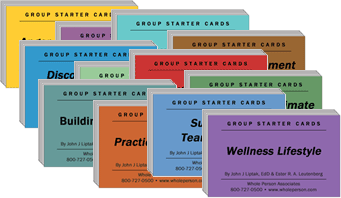Using Card Decks in Therapy Sessions
Liven up your groups and teach by doing: use cards decks with open-ended questions. Integrating knowledge while playing a card game! WPA’s cards correspond with our teen or adult mental health books.
These unique cards can be used in a variety of ways with groups exploring one or all of the corresponding books’ topics or on their own. Specific cards can be used in conjunction with identified pages, groups of cards can be used to address the theme of a section in the book or all the cards can be used to explore the overall concept of the topic. Individual cards can be selected to begin a specific session or used as an activity during a predetermined intervention. The group facilitator may wish to pre-select cards on a specific subject choosing those that are most appropriate for the members within that particular group session. The facilitator can also encourage participants to select the topic of discussion and then select the appropriate cards.
Group Arrangement – Group members can be seated in a circle with group facilitator holding the cards or around a table with cards placed in the middle of table. If group members have a difficult time with verbal communication offer options like writing answers on paper prior to sharing. You can be creative in establishing a safe environment for sharing.
Number of Participants – Recommended group size is 4-14 to allow all members the opportunity to share and interact with each other. If there is a larger group you may consider breaking into smaller groups for sharing. Upon returning to the larger group ask each small group to share what they learned from their small group discussion.
Format of the Cards – The cards are written to address each of the sections of the corresponding book. While some cards could be used to address a specific concept on a given page, the majority are written to initiate conversation around th e concept of the section. Numbers on the bottom right corner of the cards correspond to the corresponding section of the book.
e concept of the section. Numbers on the bottom right corner of the cards correspond to the corresponding section of the book.
Activity Suggestions – The use of the cards is limited only by the creativity of the group leader. The unique quality of the corresponding cards is you may use a section of cards to discuss a specific topic or all of the cards to discuss the topic of each book as a larger concept. The follow is the most traditional manner using cards for group facilitation. Group interaction and personal disclosure can be enhanced by using cards to begin a group session, tackle a difficult subject in the core of group process or to create a thoughtful closure.
Prior to using the cards set the group framework. To maintain a safe atmosphere highly encourage participants to share but to not force them to respond. Options may be to ask the participant if they would like to select another card or tell them you will give them more time to think and you will come back to them later.
- Introduce the subject of the group, (example: “Relationships”) and discuss the predetermined goals for the group session.
- Pass the deck of cards to your left or right and ask the group participant to select a card from the pile, read the card silently, and think about their answer. Then ask participant to read the card out loud and share their answer with the group.
- Continue passing the deck, repeating the process until all members have had a chance to respond to a card.
- Some of the cards might lend themselves to being passed around with everyone responding or reading it out loud and asking for volunteers.
- It is often beneficial for the facilitator to be part of the group and also select a card. It may be helpful if they select first to set the example and expectation that everyone can share or just be intermingled within the group sharing.
Process – The magic of card decks is that processing happens through the answering of the questions so a formal processing session after using the cards is often unnecessary. However, if ensuring that the group intent is being communicated asking a few general questions to the group may be beneficial.
- What is one thing you learned about_____(the topic identified -example: Stress)
- What is one thing you learned from another group member about…(coping with Stress)?
- What is something you learned about yourself?
- What is a topic you would like to explore?
- What is a goal you could set for yourself that reflects something discussed in this session?
Alternatives
- While the cards are most often used for group facilitation keep in mind they can also be extremely helpful in individual sessions when establishing a therapeutic relationship or initiating conversation.
- The cards can be used as great journal questions or a Theme-for-the-Day.
Cards encourage thinking, getting in touch with feelings and communications.

